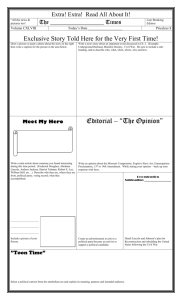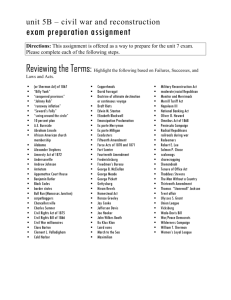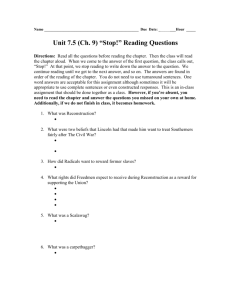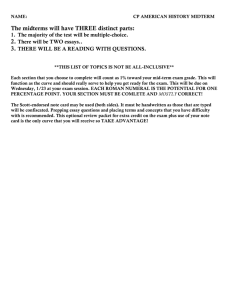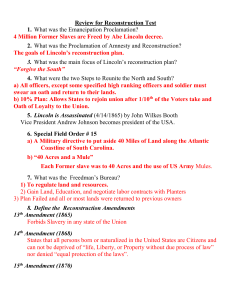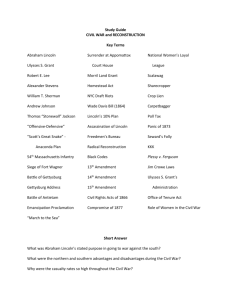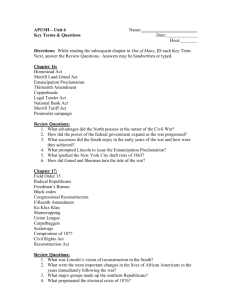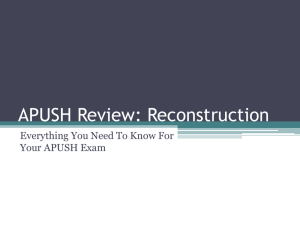Unit Three: Civil War & Reconstruction Era Study Guide
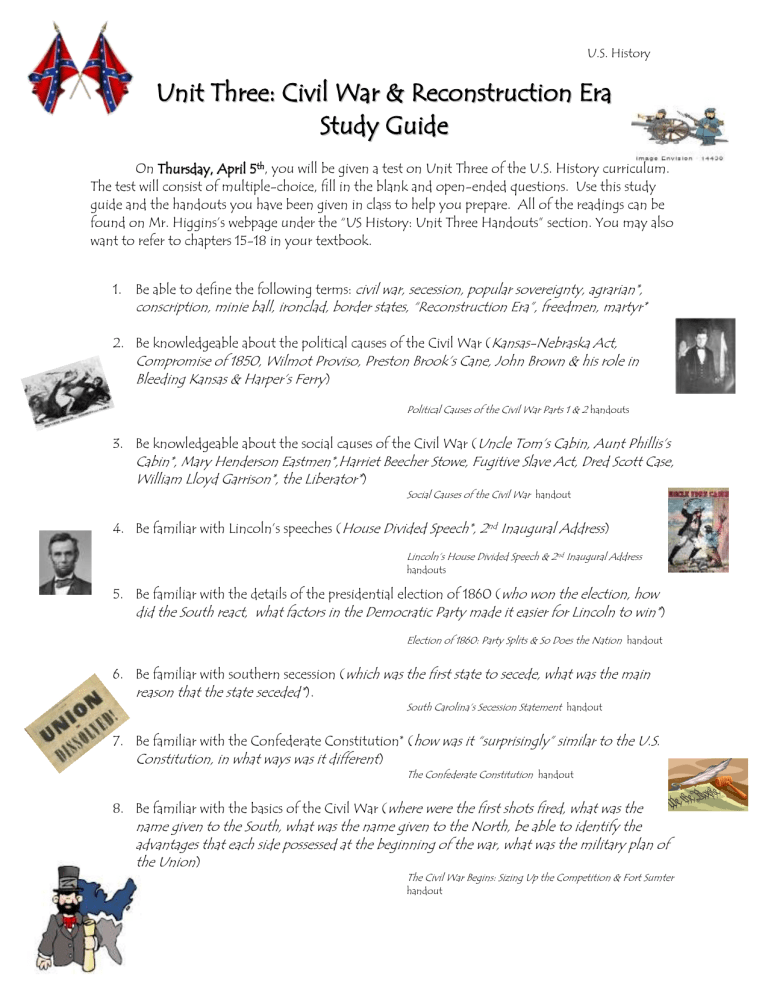
U.S. History
U n i i t t T h r r e e : : C i i v i i l l W a r r & R e c t u d y G u i i d e o n s s t t r r u c t t i i o n E r r a a
S S t
On T h u r r s s d a y , , A p r r i i l l 5 t h , you will be given a test on Unit Three of the U.S. History curriculum.
The test will consist of multiple-choice, fill in the blank and open-ended questions. Use this study guide and the handouts you have been given in class to help you prepare. All of the readings can be found on Mr. Higgins’s webpage under the “US History: Unit Three Handouts” section. You may also want to refer to chapters 15-18 in your textbook.
1.
Be able to define the following terms: civil war, secession, popular sovereignty, agrarian*, conscription, minie ball, ironclad, border states, “Reconstruction Era”, freedmen, martyr*
2.
Be knowledgeable about the political causes of the Civil War ( Kansas-Nebraska Act,
Compromise of 1850, Wilmot Proviso, Preston Brook’s Cane, John Brown & his role in
Bleeding Kansas & Harper’s Ferry )
Political Causes of the Civil War Parts 1 & 2 handouts
3.
Be knowledgeable about the social causes of the Civil War ( Uncle Tom’s Cabin, Aunt Phillis’s
Cabin*, Mary Henderson Eastmen*,Harriet Beecher Stowe, Fugitive Slave Act, Dred Scott Case,
William Lloyd Garrison*, the Liberator* )
4.
Be familiar with Lincoln’s speeches (
Social Causes of the Civil War handout
House Divided Speech*, 2 nd Inaugural Address )
Lincoln’s House Divided Speech & 2 nd Inaugural Address handouts
5.
Be familiar with the details of the presidential election of 1860 ( who won the election, how did the South react, what factors in the Democratic Party made it easier for Lincoln to win* )
6.
Be familiar with southern secession ( which was the first state to secede, what was the main reason that the state seceded* ).
Election of 1860: Party Splits & So Does the Nation handout
7.
Be familiar with the Confederate Constitution* ( how was it “surprisingly” similar to the U.S.
Constitution, in what ways was it different )
South Carolina’s Secession Statement handout
The Confederate Constitution handout
8.
Be familiar with the basics of the Civil War ( where were the first shots fired, what was the name given to the South, what was the name given to the North, be able to identify the advantages that each side possessed at the beginning of the war, what was the military plan of the Union )
The Civil War Begins: Sizing Up the Competition & Fort Sumter handout
9.
Be familiar with major figures in the Civil War ( who was the head general of the Union army at the end of the war, who was the head of the Confederate Army, who served as president of the Confederacy, who served as Lincoln’s vice-president in 1864-5, who assassinated Lincoln, who was Clara Barton, what was the Massachusetts 54 th )
10.
Be knowledgeable about the Emancipation Proclamation ( what was it, who was freed by it, how was Lincoln able to free slaves constitutionally*, why weren’t slaves in the border states free, how did the Confederacy react* )
Emancipation Proclamation: Union & Confederacy’s Perspective handout
11.
Be familiar with important battles of the Civil War ( Appomattox, VA, Battle of New Orleans,
Battle of Vicksburg, Battle of Antietam, Battle of Gettysburg )
The Civil War Begins, Civil War: 1862-1864 , the Conclusion of the War handouts
12.
Be familiar with the details surrounding Lincoln’s assassination ( who killed him, why*, how did the country react*, what were the original plans that Booth had* )
Only in America: An Actor Assassinates the President handout
13.
Be bale to discuss how Lincoln had planned on going about the process of “reconstruction”
(With malice towards none) and how his successor, Andrew Johnson planned on handling
“reconstruction”*
A Policy of Forgiveness: Lincoln’s 2 nd Inaugural Address & the
Reconstruction Era handouts
14.
Be familiar with the “gains” that African Americans made in the early years of the
Reconstruction Era ( Special Field Order #15, Freedmen’s Bureau, Radical Republicans role in these gains, Hiram Revels and Blanche Bruce, Civil Rights Act of 1866, 13 th , 14 th and 15 th
Amendments, Reconstruction Acts of 1867, election of Grant* ).
Reconstruction Era Parts 1 & 2 handouts
15.
Be prepared to discuss your feelings about the Thomas Hall quote ( Lincoln gets the praise for freeing the slaves, but did he do it?” )
Reconstruction Part 1 handout
16.
Be able to describe how southern states went about limiting the rights of African Americans in the later part of the Reconstruction Era ( black codes, literacy tests, poll taxes, sharecropping, the contract system, the rise of the KKK, the case of U.S. v. Reese and U.S. v.
Cruickshank, the Compromise of 1877 )
Reconstruction Era Parts 3 & 4 handouts
17.
Be able to explain how the Panic of 1873 led to the government’s abandonment of protecting freedmen’s rights.
Reconstruction Era Part 4 handout
